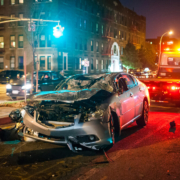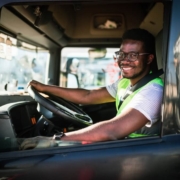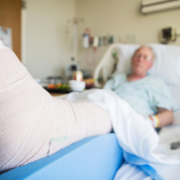The Psychological Impact of Car Accidents on Children
The trauma of being in a serious car accident can leave lasting psychological wounds, especially for child passengers. Children are uniquely vulnerable to the emotional impact of crashes and other trauma. Their brains are still developing, so they process traumatic experiences much differently than adults.
While physical injuries may heal, the invisible psychological effects of a collision can linger for years if left unaddressed. Anxiety, depression, behavioral issues, and PTSD are some common consequences children face after a traumatic auto accident. Sadly, too many children suffer needlessly because negligent drivers caused wrecks that could have been prevented.
Understanding the psychological toll of car crashes on young passengers is important for parents and for securing the services kids need to cope and heal. With compassion and proper support, children can overcome accident trauma. But recovery takes time, patience, and often the assistance of mental health professionals.
Common Psychological Effects that Car Accidents Can Have on Kids
Being involved in a vehicle collision is distressing at any age, but for children, the traumatic experience can lead to significant psychological impacts that manifest in a variety of concerning ways. Some of the most common effects include:
- Anxiety, Depression, and PTSD: It is not uncommon for children to experience heightened feelings of anxiety or develop depressive symptoms post-accident. In more severe instances, they might show signs of Post-Traumatic Stress Disorder (PTSD). This can manifest as recurring flashbacks, avoidance behaviors, or heightened reactions to seemingly unrelated triggers.
- Sleep Issues: Traumatic events can disturb a child’s sleep pattern. They may struggle with insomnia, frequently wake up during the night, or experience nightmares related to the accident. Over time, this sleep deprivation can exacerbate other psychological issues.
- Behavioral Changes and Acting Out: The trauma of an accident can cause significant behavioral alterations. A child might become more irritable, withdrawn, or exhibit aggressive behavior. It is essential to recognize these as potential signs of internal distress rather than mere acts of rebellion.
- Fear of Cars, Driving, or Riding in Vehicles: A tangible outcome of the trauma can be an acute fear of anything related to the accident. Children might become extremely apprehensive about getting into cars, show resistance to driving or being driven, or express a heightened fear during car rides.
- Difficulty Concentrating at School: The psychological aftermath of a car accident can extend to a child’s academic performance. They might find it challenging to concentrate on tasks, stay engaged in class, or complete assignments. This can be a direct result of trauma or due to associated symptoms like sleep deprivation.
Unique Vulnerability of Car Accidents on Children
Children are at increased risk for lasting emotional trauma from vehicle collisions compared to adults for several key reasons:
- Brains Not Fully Developed to Process Trauma: A child’s brain is in a state of constant growth and development. Neural pathways and connections are still being formed, especially in areas related to emotion regulation and cognitive processing. This means that when confronted with trauma, a child’s brain might not have the full capacity to understand or process the event as an adult brain would. This can lead to heightened emotional responses and difficulties in making sense of the trauma.
- Lack of Coping Skills of Adults: Over the years, adults accumulate various coping mechanisms, whether consciously developed or acquired through experiences. Children, on the other hand, lack this repository of coping strategies. They might not know how to self-soothe, distract themselves, or seek help when they are overwhelmed, making the aftermath of an accident even more challenging to navigate.
- Harder Time Expressing Feelings: Children often grapple with articulating their emotions. Whether due to a limited vocabulary, fear of repercussions, or simply not understanding what they are feeling, kids can find it tough to communicate their distress. This silence can be misleading, making it seem as though they are coping well when in reality, they are internalizing their trauma.
Coping Tips for Kids after a Car Accident
Helping a child navigate the aftermath of a car accident requires a blend of empathy, patience, and proactive strategies. Here are some tips for accomplishing this:
- Provide Reassurance About Safety – Continually reassure kids that they are safe now. Fear often lingers, so reinforce their security.
- Encourage Expression Through Play, Art, and Writing – Give them creative outlets to express confusing feelings they can’t verbalize.
- Practice Patience and Support – Recovery takes time. Don’t expect them to just “get over it.” Offer comfort consistently.
- Consider Counseling – Therapy from professionals trained in child trauma can help kids process experiences in a healthy way.
- Maintain Routines – Sticking to regular schedules provides a sense of normalcy that’s comforting.
- Be Understanding – Nightmares, bed-wetting, separation anxiety, or acting out are common. Respond calmly without judgment.
- Limit Media Exposure – Graphic images or stories related to crashes can trigger fears. Avoid overexposure.
- Communicate Openly – Have ongoing conversations to understand their feelings and concerns.
- Don’t Force Them – It is normal for kids not to want to ride in cars or talk about the accident at first. Forcing activities could re-traumatize them.
Incorporating these coping tips can make a significant difference in a child’s post-accident experience. Remember, every child is unique, and their path to healing might differ from others who have gone through this type of trauma.
Legal Considerations After an Auto Accident Involving Children
Beyond medical care, securing justice through a legal claim should be a priority for children injured in preventable auto accidents.
- Seek Legal Counsel – Consulting a personal injury attorney soon after the accident is important to understand your options and protect your child’s rights. An attorney experienced with auto accident claims can skillfully navigate the legal system.
- Consider Psychological Impacts – Car crashes can cause lasting psychological damage to kids. Accounting for these hidden harms when pursuing legal compensation is critical, as they can significantly impact their quality of life. Counselors and psychologists can help assess emotional damages.
- Focus on Your Child – An attorney should help you prioritize your child’s needs during the legal process. Managing legal, insurance, and paperwork burdens allows you to focus on your child’s healing.
- Seek Accountability – Filing a claim sends a message that drivers must be more careful to protect child passengers. Securing compensation can pay for therapy and help your child recover.
- Establish Future Costs – Emotional trauma may necessitate years of therapy and treatment. Experienced lawyers will quantify future costs, so your child is compensated for long-term needs.
Though no legal remedy can undo a traumatic accident, securing your child’s financial future and holding negligent parties accountable is important. If you or others close to you (such as your children) have suffered physical and/or psychological injuries in a car accident in Alabama, M. Adam Jones and Associates is here to help!
We have extensive experience with these types of cases and a successful track record of recovering maximum compensation on behalf of our clients. Contact us today to set up a free consultation and case assessment.
- Adam Jones,
Managing Partner
- Adam Jones & Associates, LLC
206 N. Lena St.
Dothan, AL 36303
Tel: 334-699-5599
Fax: 334-699-5588











Leave a Reply
Want to join the discussion?Feel free to contribute!